How to Connect Using an FTP Client
What Is FTP?
File Transfer Protocol (FTP) is a commonly used protocol for exchanging files over the Internet.
What Is An FTP Client?
By using an FTP client, you can upload, download, and manage files on our server. FileZilla is one of the most commonly used FTP clients.
How to Connect to FTP Using FileZilla?
- Download and install FileZilla onto your personal computer.
- Get your FTP settings
- Open FileZilla.
- Fill out the following information:
- Host: yourdomain.com or core-1.cseppento.com
- Username: FTP username (Same FTP account created in the Client Control Panel)
- Password: FTP password (Your FTP account password)
- Port: 21
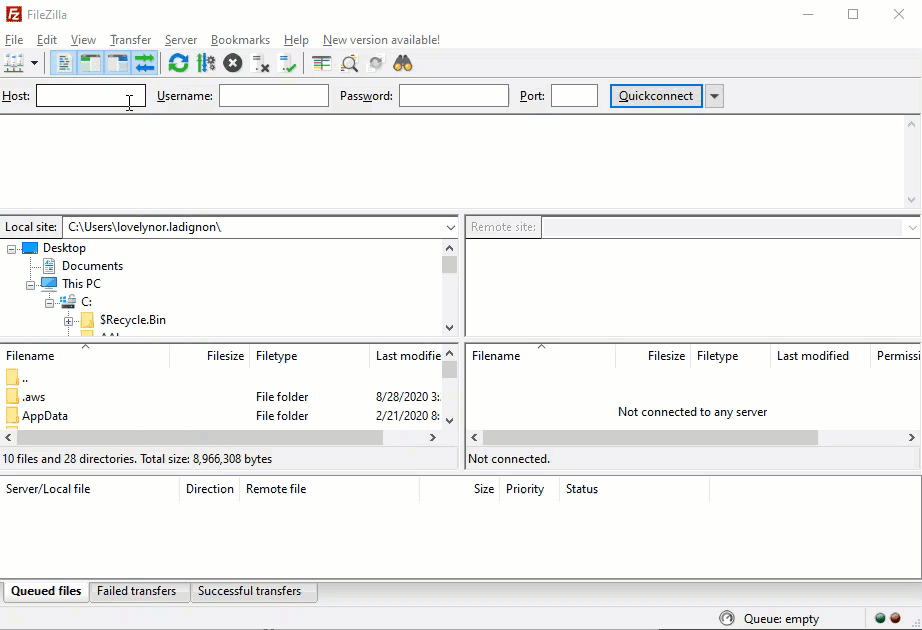
- Click Quickconnect.
- FileZilla will attempt to connect. It will display Directory Listing Successful once you are connected.
By default, FTP root accounts are still created in a new account. However, while changing the password of the root user, the account password won’t be updated.
What is SFTP?
While FTP is the traditional file transfer protocol, SFTP (Secure File Transfer Protocol) is an alternative to FTP that allows you to transfer files by adding a layer of security to the process. SFTP uses SSH (secure shell) encryption to protect the data being transferred.
How to Connect to SFTP Using FileZilla?
- Open FileZilla.
- Go to File -> Site Manager. The Site Manager settings dialogue is displayed. Enter the following information under the General tab:
- Host/Address: core-1.cseppento.com, where PrimaryDomain is your hosting account primary domain, set in your Domains dashboard.
- Example: example.com (where example.com is your domain)
- Port: 22
- Logon Type: Normal
- Protocol (Server Type): SFTP – SSH File Transfer Protocol
- User: username (Same as your hosting account username)
- Password: password (Your account password)
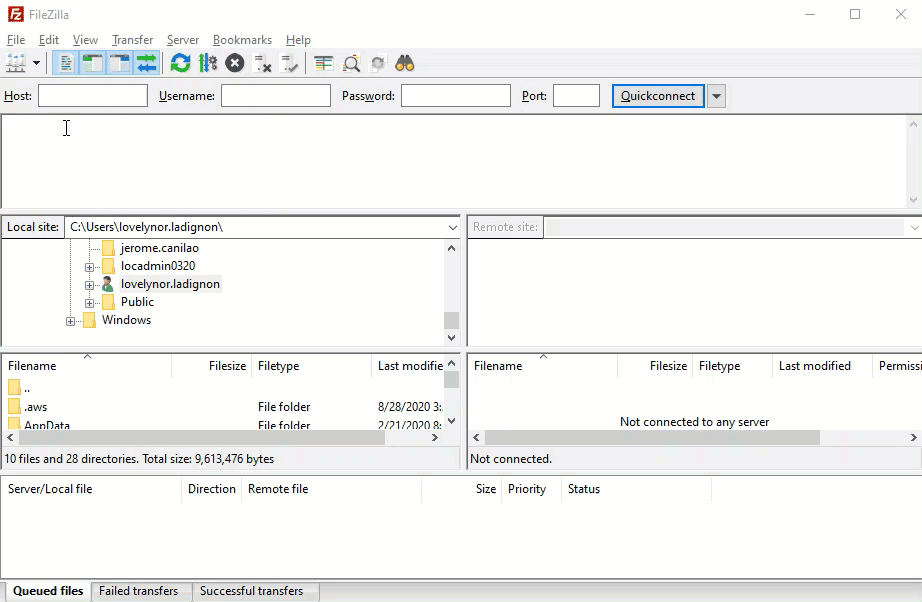
By default, FTP root accounts are still created in a new account. However, while changing the password of the root user, the account password won’t be updated.
How to Upload Files Using FileZilla?
- Connect to FTP.
- Use the Local Site area of FileZilla to locate the folder containing the files you want to upload. The web folder is where your site files are to be situated. If you require a different folder or custom apache directives, please contact support.
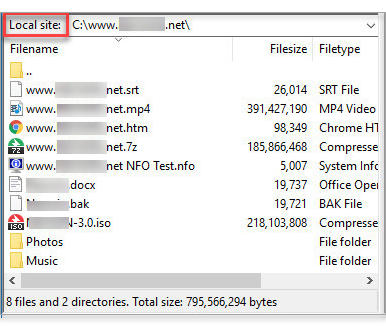
- Use the Remote Site area of FileZilla to locate the folder you want to upload your files into. The Remote Site is where your hosting files are located. It is a representation of your FileManager.
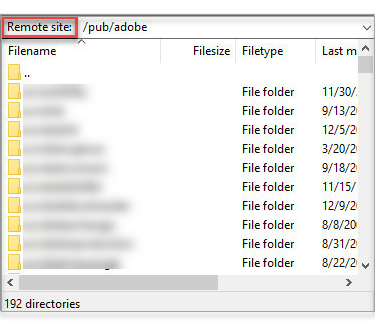
- Note that the contents for each folder are displayed just below the Local Site and Remote Site areas.
- Click and drag your file from the Local Site side onto the Remote Site side (Note that you can also select multiple files at a time).
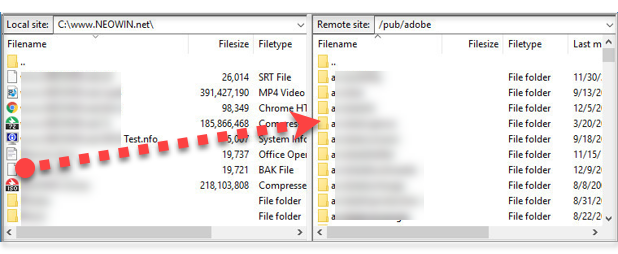
- Upload progress is displayed in the bottom area of FileZilla.
- Upload is complete once your uploaded files are listed on the Remote Site side.How to Download Files Using FileZilla?
- Connect to FTP.
- Use the Remote Site area of FileZilla to locate the folder containing the files you want to download.
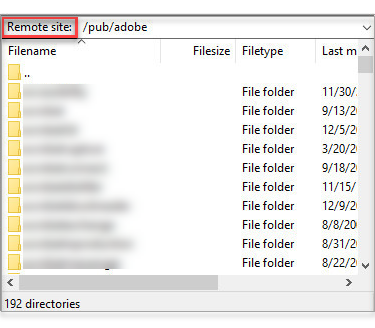
- Use the Local Site area of FileZilla to locate the folder you want to download your files into.
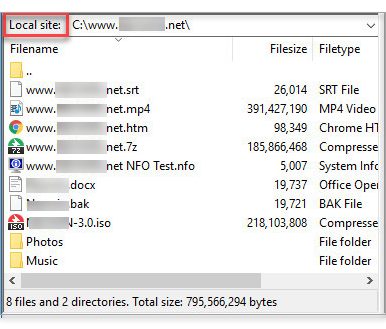
- Note that the contents for each folder are displayed just below the Remote Site and Local Site areas.
- Click and drag your file from the Remote Site side onto the Local Site side (Note that you can also select multiple files at a time).
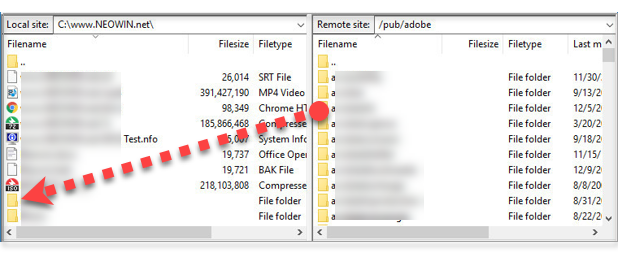
- Download progress is displayed in the bottom area of FileZilla.
- The download is complete once your downloaded files are listed on the Local Site side.
Note: Click on the root folder (“/”) if you wish to download all files on the server. Otherwise, select the subfolder or the files you intend to back up.
What Other FTP Clients Could I Use? Here are a few options for you to consider:
- CuteFTP
- FlashFXP
- SmartFTP
- WS FTP
Prevent FTP Blacklisting As a security precaution against malicious attackers, our FTP servers will blacklist the IP address of users that have an excessive number of consecutive failed login attempts. This blacklist prevents the user from gaining access into our FTP servers, even if the user begins using the correct login credentials.
To avoid the risk of being blacklisted, make sure that you keep your FTP client’s login credentials up to date. Additionally, we recommend that you limit the number of reconnection attempts inside of your FTP client.
To limit the number of reconnection attempts inside of FileZilla:
- Go to Edit.
- Click on Settings.
- In the window that appears, we recommend that you enter the following settings:
- Maximum number of retries: 3
- The delay between failed login attempts: 300
Options for SmartFTP How to set the timeout value?
- Select Favorites > Edit Favorites from the SmartFTP menu. The SmartFTP Favorites window appears.
- From the SmartFTP Favorites, window select the Favorite for which you want to set the Connection Timeout. Right-click on the Favorite and select Properties. The Properties dialogue appears.
- Select Connection. From the Connection tab under the Options list select Use Favorite Settings
- You can set the number of Maximum Retries, Retry Delay time, and the Connection Timeout by typing out the value you want it to be set to, or you can use the up and down arrows. The default value for the Connection Timeout is 30 seconds
- Click on the “OK” button to save the changes.
Note: SmartFTP saves the Connection settings per Favorite. If you want to set the Connection Settings for a single transfer, for example, you can make a copy of the Favorite of interest and change the Connection Properties there, so that the original Favorite Properties remain.
- Host/Address: core-1.cseppento.com, where PrimaryDomain is your hosting account primary domain, set in your Domains dashboard.